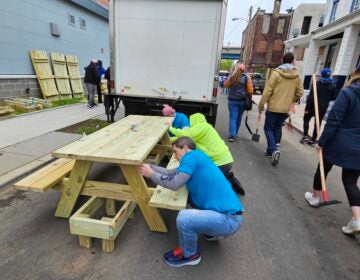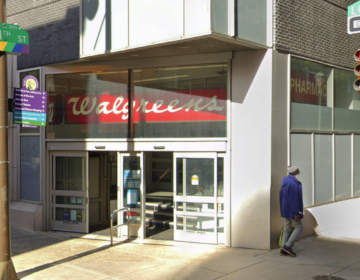OARC’s sustainability tips for NW Philly
OARC’s Sustainability Tips
Below are the results of two of the questions from the online survey. These graphs are representative of the fact that many people have not taken measures to improve the energy efficiency of their homes and many of the strategies to save energy are not used, are unknown, or are confusing.
Have you ever had an energy audit performed on your house?
12% said: Yes
88% said: No
Do you currently have a rain barrel on your property?
6.3% said: Yes
70.6% said: No
23% said: “I don’t know what a rain barrel is.”
Individuals have the ability and power to reduce their environmental impact and make their community a sustainable one. Reducing the amount of waste you generate and your energy, gas, and water consumption means fewer greenhouse gas emissions, cleaner air and water, and cheaper utility bills.
The purpose of the set of tips below is to show different ways to reduce your impact on the environment, waste generation, and energy and water consumption and the resulting savings from doing so. If everyone in the Northwest Philadelphia communities followed the recommendations, the savings and benefits would add up and have a huge impact.
|
Area of Sustainability |
Suggestion |
Potential Household Savings |
Potential Block Savings |
Potential Northwest Communities Savings |
|
Stormwater Management |
Install a Rain Barrel |
$5 and 1,300 gallons of water during peak summer months |
$260 and 65,000 gallons of water during peak summer months |
$145,000 and 36.5 million gallons of water during peak summer months |
|
Waste Management |
Use a Compost Bin |
1,200 lbs of waste per year |
$1,900 in city disposal fees and 30 tons of waste per year |
$1.1 million in city disposal fees and 16,600 tons of waste per year |
|
Waste Management |
Recycle |
1,900 lbs of waste per year |
$3,100 in city disposal fees and 48 tons of waste per year |
$1.8 million in city disposal fees and 27,000 tons of waste per year |
|
Waste Management |
Use RecycleBank |
Up to $540 (5,400 points) per year |
$27,000 (270,000 points) per year |
$15.1 million (151 million points) per year |
|
Waste Management |
Use Rechargeable Batteries |
$11 and 22 batteries per year |
$540 and 1,080 batteries per year |
$302,500 and 605,000 batteries per year |
|
Energy Conservation |
Install CFLs |
$40 and 470 kWh per year (5 CFLs per household) |
$2,000 and 23,500 kWh (5 CFLs per household) |
$1.1 million and 13.1 million kWh (5 CFLs per household) |
|
Energy Conservation |
Use Thermostat Setbacks |
$180 per year |
$9,000 per year |
$5 million per year |
|
Energy Conservation |
Use Smart Strip Power Strips |
$240 per year (1 per household) |
$12,000 per year (1 per household) |
$6.7 million per year (1 per household) |
|
Energy Conservation |
Use ENERGY STAR Air Conditioner Units |
$12 per year (2 per household) |
$600 per year (1 per household) |
$336,000 per year (2 per household) |
|
Energy Conservation |
Seal Air Leaks and Add Insulation |
$220 per year |
$11,000 per year |
$6.2 million per year |
|
Energy Conservation |
Turn Down the Water Heater Temperature and Insulate Tank and Water Pipes |
$160 and 1,000 kWh per year |
$8,100 and 50,500 kWh per year |
$4.5 million and 28.3 million kWh per year |
|
Energy Conservation |
Seal Ducts |
$140 per year |
$7,000 per year |
$3.9 million per year |
|
Water Conservation |
Use WaterSense Faucets or Aerators |
$13 and 3,200 gallons of water per year |
$640 and 161,000 gallons of water per year |
$360,000 and 90 million gallons of water per year |
|
Water Conservation |
Use WaterSense Showerheads |
2,300 gallons of water, $57, and 300 kWh per year |
115,000 gallons of water, $2,900, and 15,000 kWh per year |
64.4 million gallons of water, $1.6 million, and 8.4 million kWh per year |
|
Transportation |
Car Sharing |
$6,000 per year, 1 personal vehicle off the road, and 219 gallons of oil per year |
$84,000, 14 personal vehicles off the road, and 3,000 gallons of oil per year (10% car share users) |
$45.4 million, 3,000 personal vehicles off the road, and 1.6 million gallons of oil per year (10% car share users) |
|
Transportation |
Carpool |
$2,700, 500 gallons of oil, and 1 personal vehicle off the road per year |
$73,000, 13,500 gallons of oil, and 27 personal vehicles off the road per year (20% carpoolers) |
$40.8 million, 7.5 million gallons of oil, and 15,000 personal vehicles off the road per year (20% carpoolers) |
|
Transportation |
Use Public Transportation |
$11,215 per year (50% users) |
$762,620 per year (50% users) |
$424 million per year (50% users) |
|
Green Building Technologies |
Quanta Low-e Panel |
$200 per year |
$10,000 per year |
$5.6 million per year |
|
Green Building Technologies |
ARE Solar Panels |
$1,300 per year |
$65,000 per year |
$32.6 million per year |
|
Amount of Annual Savings (Not including Transportation and Solar Panels): |
$1,818 |
$96,040 |
$116.2 million |
|
Additional Annual Savings from Car Sharing: |
$6,000 |
$84,000 |
$45.4 million |
|
Additional Annual Savings from Carpooling: |
$2,700 |
$73,000 |
$40.8 million |
|
Additional Annual Savings from Public Transportation: |
$11,215 |
$762,620 |
$424 million |
|
Additional Annual Savings from Solar Panels: |
$1,300 |
$65,000 |
$32.6 million |
|
Breakdown of Savings:
|
6,800 gallons of water |
341,000 gallons of water |
190.9 million gallons of water |
|
1,200 lbs of compost waste |
30 tons of compost waste |
16,600 tons of compost waste |
|
|
1,900 lbs of recycled waste |
48 tons of recycled waste |
27,000 tons of recycled waste |
|
|
1,770 kWh |
89,000 kWh |
49.8 million kWh |
|
|
1 vehicle off the road and 219 gallons of oil (car sharing) |
14 vehicles off the road and 3,000 gallons of oil (car sharing) |
3,000 vehicles off the road and 1.6 million gallons of oil (car sharing) |
|
|
1 vehicle off the road and 500 gallons of oil (carpooling) |
27 vehicles off the road and 13,500 gallons of oil (carpooling) |
15,000 vehicles off the road and 7.5 million gallons of oil (carpooling) |
|
|
22 batteries |
1,080 batteries |
605,000 batteries
|
OARC is a non-profit, 501(c) (3) community development corporation whose primary mission is to create and stimulate economic development while improving the quality of life for residents in West Oak Lane and other neighborhoods throughout the Northwest section of Philadelphia. OARC is dedicated to using green and sustainable methods to accomplish this mission.
OARC’s goal is to make Northwest Philadelphia a sustainable community where residents can raise their families, operate a business, educate their children, spend their leisure time, and enjoy arts and cultural activities. OARC wants to incorporate the residents themselves into this plan and has used a focus group and online survey to gather their input and ideas.
WHYY is your source for fact-based, in-depth journalism and information. As a nonprofit organization, we rely on financial support from readers like you. Please give today.




